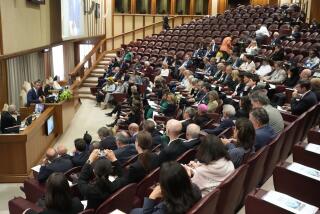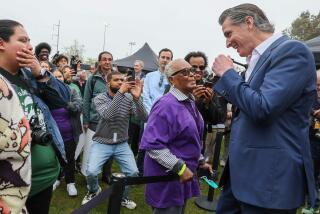Bush Voices Concerns to Pope About U.S. Catholic Church
VATICAN CITY — President Bush expressed concern Tuesday to Pope John Paul II about the standing of the U.S. Roman Catholic Church, which has been battered by a pedophilia scandal, a White House spokesman said.
Although Press Secretary Ari Fleischer did not elaborate, White House officials emphasized that the president spoke about the church’s situation in America but did not necessarily address in specific the question of priests and sexual abuse of children.
Still, by acknowledging his concerns in public and discussing the matter with the pontiff, however gingerly, Bush interjected himself into the most difficult issue the church is facing.
It was an unusual step for a U.S. official to take, in a political culture in which leaders are wary of entering a religious fray. However, it reflected both the importance of Catholic voters to Bush and the anger the scandal has raised among them.
Before Bush left Washington, White House officials had strongly suggested that he would not address the scandal unless John Paul brought it up, which they considered unlikely. They had said only that the president would talk about whatever the pontiff wanted to address.
The president and the pope met privately for about 20 minutes, with neither aides nor translators, in the pope’s private library, decorated with a painting of the Virgin Mary on a throne.
Fleischer would not elaborate on Bush’s remarks about the church’s standing. But he said the president and the pope also spoke in English about U.S.-Russian relations, the Catholic Church in Russia and the Middle East.
In a veiled but clear reference to the scandal, Vatican spokesman Joaquin Navarro-Valls said in a statement on the meeting: “His holiness ... wanted to express, despite the difficulties of the moment, his trust in the spiritual resources of American Catholics committed to bearing witness to the values of the Gospel in society.”
The meeting was the second in a year between the two leaders. Immediately after the meeting, Bush headed back to Washington, ending a weeklong trip to Germany, Russia, France and Italy.
Asked during the morning whether he would raise the sexual abuse issues with the pontiff, Bush said he would “listen carefully to what the pope has to say. He’s a man of enormous dignity and compassion.”
Then he added: “I will tell him that I am concerned about the Catholic Church in America; I’m concerned about its standing.”
The president said he would make such comments to the pope while recognizing that the church “is an incredibly important institution in our country.”
He said he also would tell the pope that he appreciated his “leadership in trying to strengthen the Catholic Church in America.”
It was one of the few times Bush has addressed the scandal in public. At a news conference March 13, the president said that he knows many within the church leadership and that they are “men of integrity and decency. They’re honorable people.
“I’m confident the church will clean up its business and do the right thing.... I trust the leadership,” he said at the time.
Bush Has Aggressively Courted Catholic Voters
The scandal in the Catholic Church has put Bush in a difficult position. As president, he is expected to demonstrate leadership in whatever moral issues cross the U.S. political landscape. But the American respect for keeping religion and government at a healthy distance from each other makes it particularly sensitive for him to enter into such a controversy.
The issue carries additional sensitivities because the president, a Methodist, has aggressively courted the Catholic vote. The first dinner he attended in Washington outside the White House was at the home of Cardinal Theodore E. McCarrick, the Washington archbishop, and Bush frequently meets with church leaders and speaks to Catholic organizations.
For his part, the pope sees his role as exercising moral leadership around the world and has at times spoken out forcefully on the American approach to such issues as abortion and the death penalty.
On his first visit to the Vatican, last July, the president heard John Paul lecture him on the dignity of human life, in what was interpreted as a direct effort to persuade Bush not to open up the field of stem cell research in the United States.
At the time, John Paul told Bush--who was about to address what was then the most complex political issue he was facing--that the use of human embryos for medical research was an “evil” akin to abortion and infanticide.
Within three weeks, Bush announced that he would allow the federal government to fund medical research using stem cells taken from a limited number of embryos.
Although the Vatican staunchly opposes using the cells taken from embryos, which are destroyed in the process, Bush’s decision was seen as a compromise because it permitted only the use of already available stem cells and blocked expansion of federally funded research to include collecting cells from additional embryos.
In Washington, Bush’s readiness to raise the abuse scandal was seen as a matter of domestic politics rather than Washington-Vatican foreign policy--and a reflection of the presence on the trip of Karl Rove, Bush’s top political advisor.
Bush “can’t go to the Vatican without raising the issue in the most gentlemanly, diplomatic fashion,” said a veteran of senior posts in several Republican administrations, who spoke on condition of anonymity.
He said the sensitive way for Bush to approach the matter was to express concern about what the scandal was doing to the church--and not express concern about sexual abuse itself.
“It plays well with those in the Catholic Church in the United States who are concerned. Bush is burnishing his moral standing. This is all dictated by politics,” giving the president an opportunity to appeal to the Catholic laity grown angry over the church’s response to the scandal, he said.
Bush’s relations with Catholics have been a sensitive matter since his visit to Bob Jones University in South Carolina during the 2000 presidential campaign. The school had a history of discriminating against Catholics.
At the start of their private session Tuesday, the pope and the president posed for pictures.
As photographers’ lights flashed, John Paul shielded his eyes. Bush said, “They’ll make you look good, your Holy Father.”
After the 20-minute private audience, they were joined by Secretary of State Colin L. Powell, National Security Advisor Condoleezza Rice, White House Chief of Staff Andrew H. Card Jr., Rove and others.
The president gave the pope a silver oval medallion with a hand-painted image of the Virgin Mary; the pope gave Bush a statue of Mary.
When the Americans got up to leave, the pope said, in English, “God bless America.”
Gerstenzang reported from Rome and Holley from Vatican City.
More to Read
Sign up for Essential California
The most important California stories and recommendations in your inbox every morning.
You may occasionally receive promotional content from the Los Angeles Times.










